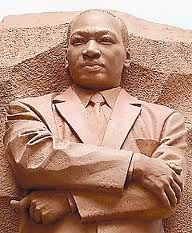“Punting the Pundits” is an Open Thread. It is a selection of editorials and opinions from around the news medium and the internet blogs. The intent is to provide a forum for your reactions and opinions, not just to the opinions presented, but to what ever you find important.
Thanks to ek hornbeck, click on the link and you can access all the past “Punting the Pundits”.
Wednesday is Ladies’ Day.
Follow us on Twitter @StarsHollowGzt
Bryce Covert: An Unfulfilled Dream From the March on Washington: Labor Rights for Domestic Work
Fifty years ago on August 28, thousands of protesters descended on Washington, DC. The protest is colloquially known as the March on Washington, but it’s worth remembering its full name: “The March on Washington for Jobs and Freedom.” In fact, the economic repression people of color experienced played a central role in galvanizing the march and in the demands the marchers made.
The protesters laid out ten concrete demands, half of which had economic implications: legislation barring discrimination in public housing, a federal jobs training and employment program, an increase in the minimum wage, an act barring discrimination by governments and contractors, and an expansion of the Fair Labor Standards Act (FLSA) “to include all areas of employment which are presently excluded.”
Progress on these economic demands has been slow and bumpy.But that last bullet-point is a very concrete dream that has been denied. While the FLSA has been expanded since then, a whole category of workers-who are also disproportionately people of color-are still left out.
Katrina vanden Heuvel: Boycott Sochi? Think again.
In the run-up to the 2014 Winter Olympics in Sochi, Russia, the Kremlin is getting torched.
An international chorus of critics has assailed Vladimir Putin’s government for enacting a law that bans any discussion of lesbian, gay, bisexual or transgender (LGBT) relationships, rights and issues wherever children might be present. Many protesters are calling for a global response. [..]
Yet it’s not all that clear whether today’s clamor, however well-intentioned, will improve the lives and human rights of gay people in Russia. Unless we take the time to understand the reasons behind the ascendance of hyper-conservative traditionalist values in Russia and then develop a more strategic response, we may instead strengthen the already powerful nationalist forces in the country.
Phyllis Bennis:
Moral Obscenities in Syria
The threat of a reckless, dangerous, and illegal US or US-led assault on Syria is looking closer than ever.
The US government has been divided over the Syria crisis since it began. Some, especially in the Pentagon and some of the intelligence agencies, said direct military intervention would be dangerous and would accomplish nothing. Others, especially in Congress and some in the State Department, have demanded military attacks, even regime change, against the Syrian leadership, even before anyone made allegations of chemical weapons. The Obama administration has been divided too, with President Obama seemingly opposed to any US escalation. The American people are not divided-60 percent are against intervening in Syria’s civil war even if chemical weapons were involved.
But the situation is changing rapidly, and the Obama administration appears to be moving closer to direct military intervention. That would make the dire situation in Syria inestimably worse.
Jessica Valenti: Free Abortions on Demand Without Apology
When did so many feminists get polite on abortion? I cannot take hearing another pundit insist that only a small percentage of Planned Parenthood’s work is providing abortions or that some women need birth control for “medical” reasons. Tiptoeing around the issue is exhausting, and it’s certainly not doing women any favors.
It’s time resuscitate the old rallying cry for “free abortions on demand without apology.” It may not be a popular message but it’s absolutely necessary. After all, the opposition doesn’t have nearly as many caveats. They’re fighting for earlier and earlier bans on abortions, pushing for no exceptions for rape and incest, fighting against birth control coverage-even insisting that they have the right to threaten abortion providers. The all-out strategy is working; since 2010, more than fifty abortion clinics have stopped providing services.
The anti-choice movement isn’t pulling any punches-why should we?
Zoë Carpenter: Another Delay for Keystone XL?
The Obama administration may put off its decision about the Keystone XL pipeline until next year because of an inquiry into a contractor’s alleged conflicts of interest.
The State Department’s Office of the Inspector General is investigating allegations that Environmental Resources Management (ERM), the company hired to conduct the environmental assessment of the pipeline, hid its ties to TransCanada, the pipeline’s backer, as well as to other tar sands stakeholders. On Friday, the OIG announced that its probe would not be completed until January 2014, suggesting that the State Department might not issue its final recommendation on whether to grant a permit for the project this fall as expected. [..]
If the OIG inquiry does delay State’s decision, it will be a temporary win for pipeline opponents. There are signs that investors are losing interest in Alberta’s oil sands because of continued setbacks, lessening some of the pressure behind the project. But KXL won’t be dead until the Obama administration calls it.
Alice Slater: Time for a Missile Ban Treaty
This July, only one day after the US celebrated another anniversary of its Declaration of Independence from tyranny, it was reported that once more, a test of US anti-missile defenses against incoming long-range ballistic missiles, launched from Vandenberg Air Force Base in California had failed again.
This was the third consecutive test of the Missile Defense Agency’s Ground-Based Mid-Course system, in which our military was unable to intercept an incoming missile, programmed to target the US, which had been launched towards the mainland from the U.S. Army’s Reagan Test Site on Kwajalein atoll, in the Marshall Islands. This lunatic program, dreamt up by Reagan and known by its comic book reality, Star Wars, will never work.

 His speech,
His speech,
Recent Comments